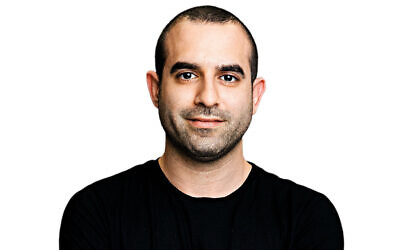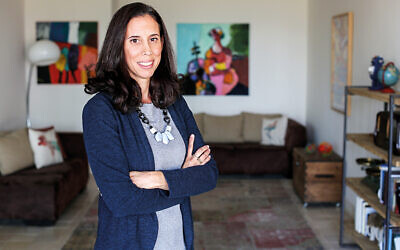The corporate buzzword changing everything
The founder of an Israeli digital platform explains what cryptocurrencies are used for and why Israel is a leader in this field of decentralised digital currency
Do you know your Bitcoin from your Ethereum? Be it blockchain, non-fungible tokens (NFTs), stablecoins and more, cryptocurrencies have hit the mainstream over the past couple of years.
Cryptocurrencies are a type of digital currency decentralised and not controlled by any government. Formerly known as cybercurrencies, the launch of Bitcoin in 2009 catapulted cryptocurrencies into the limelight. There are more than 200 million cryptocurrency users worldwide, and more than 10,000 businesses. The market is now estimated to have a $1.2 trillion (£1tr) market cap. And Israel is a key global player in the market.

So what exactly are cryptocurrencies and what does their future hold? Few are more qualified to explain than Ben Samocha (left), a Bitcoin and cryptocurrency entrepreneur and ‘evangelist’. Samocha is the founder of cryptojungle.co.il, the leading Israeli digital platform for news, guides, analysis, and educational courses.
Q. In layman’s terms, what is cryptocurrency and how is it used?
A. A cryptocurrency is a general term for a new type of money that lives on the internet and is using cryptography, a field of mathematics, for its security.
Cryptocurrencies are unique as they are aiming to be decentralised, meaning there’s no central party involved – like a government or a central bank – in making decisions or maintaining the software.
Each cryptocurrency has a different use case. Some are used for local and international payments, some are used as governance and some are a replica of a security such as a bond or stock.
What are the different subcategories within cryptocurrency?
NFTs (non-fungible tokens) – these are special digital assets, such as art, trading cards, comics and games.
Blockchain currencies – these are used to pay the transaction fees of the blockchain and are created from mining, such as bitcoin (for the Bitcoin blockchain) and ether (for the Ethereum blockchain).
Tokens – these are used for dApps (decentralised apps) to stimulate and engage the economy and community, which are in the thousands and were created primarily via token sales (ICO, or initial coin offerings, of different sorts).
Stablecoins – pegged / backed by an asset (such as USDT, which is backed by the US Dollar), a group of assets or an algorithm (such as DAI, which is backed by a token that is locked in a smart contract). They serve as a stable alternative, the price of which is pretty much constant and doesn’t fluctuate.
Security tokens – these could be explained as digitised shares or securities and
enable one to hold ownership just like a shareholder.
Q. How is cryptocurrency used?
A. Usually, geography determines the usage of the different cryptocurrencies. In ‘third world’ countries, Bitcoin and other cryptocurrencies, such as stablecoins, are adopted for everyday payments and as a store of value given the inflation and economic uncertainty the population is suffering from. However, in the West, it is mainly adopted as either an investment vehicle or a store of value, like an alternative to gold’s historical role.

Q. What makes Israel a leader in this area?
A. As a start-up and innovation hub, Israeli entrepreneurs have been among the first to comprehend how much of a revolution cryptocurrencies bring with them. Therefore, Israeli start-ups are responsible for more than five percent of the general investments made in the space. Recently, both Starkware and Fireblocks raised funds with a valuation of $8bn.
Q. Who are some of the major Israel players in the area?
Security / custodianship: Fireblocks, Unbound Tech, Curv, GK8
Exchanges / payments processing: eToro, Simplex, Efficient Frontier
Venture Capital: Collider Ventures
Wallets: ZenGo, Fuse, Breez
DeFi: Kirobo, Bancor
Q. What are the major trends within crypto?
A. The current major trends are NFTs. They are supposed to (but do not always) represent digital scarcity. The major use case being presented to the public is digital art and collectibles; however, NFTs are gaining more traction in other fields as well, such as finance and relationships with content creators. Gaming and Play2Earn is another trend that’s gaining traction. Andreessen Horowitz, one of the largest venture capital (VC) firms in the world, just raised $450m to invest in cryptogaming projects. Generally, Play2Earn allows users to monetise their in-game winnings, while blockchain and cryptoassets as a whole are expected to provide a marketplace for moving assets’ values between different games.
Q. How has the industry grown over the past few years?
A. The shift in narrative has been broad-based since March 2020, when Bitcoin first collapsed and then rebounded quickly. Several things happened simultaneously:
Lockdowns provided more free time to learn, and have helped people increase their technological capabilities and education;
Government spending and central bank ‘money printing’ led to significant monetary inflation, which has led people to understand they need an alternative that doesn’t punish them for using the money;
Cryptocurrency technology, and the ecosystem around it, has improved significantly since the last cycle that ended in 2017. That has provided the grounds for much more scale and utility.
Q. How do you see the future of cryptocurrency?
A. I see cryptocurrency as a whole as the ‘internet of money’ – while the revolution of the internet allowed us to completely change what we know about communication and information. Bitcoin and cryptocurrencies are a revolution in money and how we exchange and store value over time and across space. I believe that cryptocurrencies and cryptoassets are going to ‘take over the world’ – whether it’s the centralised part of it (ie stocks and bonds on a public transparent record) or the decentralised part of it (allowing people to choose their own money).
EXPERT VIEW: Cryptocurrencies are not just about new financial models but about society’s future

Adi Karmon Scope (left) is a crypto veteran, entrepreneur, cryptoeconomics architect, founder of Budhi, a Web 3.0 co-creation platform and a public speaker on the future of work and money. This is her view:
“Cryptocurrency and Bitcoin are not only about new financial models and technologies that enable decentralised public ledgers. They are about the future of our society as well. Cryptocurrency introduced new ways for a large group of people to make crucial decisions using ‘consensus protocols’. It’s about redefining how we organise in groups, not having to form centralised and multilayer hierarchical structures, like we have in corporations today.
Rather, decentralised autonomous organisations, or DOAs, enable each participant the freedom of choice to choose how they want to contribute to the organisation and to receive compensation without having to report to a manager or work on something about which they have no passion. With the great resignation taking place, it’s critical that we provide solutions and Web 3.0 platforms that enable freedom and flexible structures, incentives for people to collaborate and express their zone of genius and decision-making protocols to replace the existing
work model.”

Thank you for helping to make Jewish News the leading source of news and opinion for the UK Jewish community. Today we're asking for your invaluable help to continue putting our community first in everything we do.
For as little as £5 a month you can help sustain the vital work we do in celebrating and standing up for Jewish life in Britain.
Jewish News holds our community together and keeps us connected. Like a synagogue, it’s where people turn to feel part of something bigger. It also proudly shows the rest of Britain the vibrancy and rich culture of modern Jewish life.
You can make a quick and easy one-off or monthly contribution of £5, £10, £20 or any other sum you’re comfortable with.
100% of your donation will help us continue celebrating our community, in all its dynamic diversity...
Engaging
Being a community platform means so much more than producing a newspaper and website. One of our proudest roles is media partnering with our invaluable charities to amplify the outstanding work they do to help us all.
Celebrating
There’s no shortage of oys in the world but Jewish News takes every opportunity to celebrate the joys too, through projects like Night of Heroes, 40 Under 40 and other compelling countdowns that make the community kvell with pride.
Pioneering
In the first collaboration between media outlets from different faiths, Jewish News worked with British Muslim TV and Church Times to produce a list of young activists leading the way on interfaith understanding.
Campaigning
Royal Mail issued a stamp honouring Holocaust hero Sir Nicholas Winton after a Jewish News campaign attracted more than 100,000 backers. Jewish Newsalso produces special editions of the paper highlighting pressing issues including mental health and Holocaust remembrance.
Easy access
In an age when news is readily accessible, Jewish News provides high-quality content free online and offline, removing any financial barriers to connecting people.
Voice of our community to wider society
The Jewish News team regularly appears on TV, radio and on the pages of the national press to comment on stories about the Jewish community. Easy access to the paper on the streets of London also means Jewish News provides an invaluable window into the community for the country at large.
We hope you agree all this is worth preserving.






















